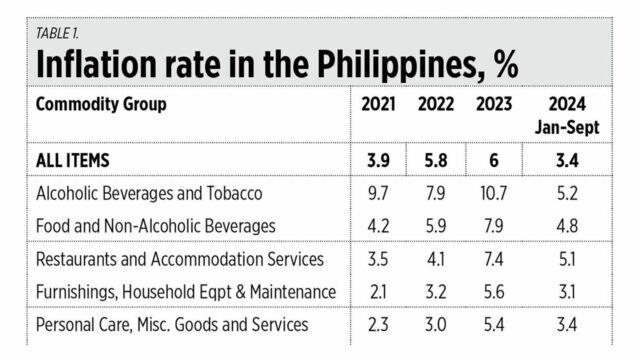HOURS after cutting interest rates for the first time in four years, Andrew Bailey, 65, made his debut on TikTok.
It was a cautious foray for the Bank of England (BoE) governor into a social media platform known for dance battles and lip-syncing. Rather than attempt any such physical feats, Mr. Bailey got out of his comfort zone by sitting down with a personal finance influencer to explain monetary policy to a younger generation increasingly suspicious of central banking. He even abandoned his omnipresent jacket and tie to project a looser, approachable vibe.
“I read all these articles about Taylor Swift’s impact and say, ‘Yeah, it’s interesting, but it’s not the big story,’” Mr. Bailey told his interviewer, Abigail Foster, dropping a name sure to resonate with the kids while discussing the BoE’s fight to contain rising prices. (Splurging Swifties may have made that job harder when the Eras Tour rolled through Britain this summer.)
The interview is part of an evolution in the way the 330-year-old central bank — founded to fund William III’s wars in France — is trying to communicate with Generation Z, which reads few newspapers and financial news wires. While hardly a viral hit, Bailey’s video got over 42,000 views on TikTok and almost 3,000 likes on Instagram.
In recent months, the Old Lady of Threadneedle Street has enlisted influencers to expand its audience, amassing more Instagram followers than the European Central Bank. The BoE similarly featured dancing show stars Curtis and AJ Pritchard in a video to launch the new King Charles bank notes earlier this year.
Such outreach is important not only because of changing news consumption habits, but the BoE’s new, more challenging relationship with the public. While older generations might remember the world’s central bankers rushing to the rescue during financial crises past, the recent inflation shock prompted the BoE and its peers to dramatically ramp up borrowing costs, putting mortgages and car loans increasingly out of reach.
“The cost-of-living crisis significantly increased young people’s interest,” said Mr. Foster, the 30-year-old certified public accountant who interviewed Mr. Bailey. Younger people can “feel quite disconnected from financial institutions,” she said, pointing to widespread misinformation online about personal finance.
Besides posting regular social media videos explaining student loans, pension plans and investment savings accounts, Mr. Foster also founded and runs Elent, which teaches finance workshops in schools and offices.
Overall, public confidence in the bank plunged as prices soared, with the youngest age groups being the most dissatisfied with the BoE’s performance, according to its latest inflation attitudes survey. At the same time, political figures, such as former Prime Minister Liz Truss, have grown more vocal in blaming the BoE for Britain’s ills.
Online, theories circulate about how central bankers’ policies are exacerbating inequality or that their planned digital currencies are intended to control people’s behavior. The BoE is at a risk of losing touch with a growing segment of consumers at a time when interest rate decisions are reaching deep into the lives of Britons.
Still, the bank must tread carefully when a single adjective by a key policy maker can make markets swoon. Asked to discuss its social media strategy, the BoE acknowledged that it is bolstering efforts to reach the young.
“We think it’s important for the bank to explain what we do and why to as broad an audience as possible,” a BoE spokesperson said in a statement. “That’s why we’ve been increasing our efforts to reach people where they get their news and information.”
The BoE is somewhat late to the party. The BoE’s youth forum — a panel of 24 young people discussing how policy affects them — warned officials in 2022 that they needed to post their own content to counter misinformation. The bank’s latest annual report also flagged trends on social media as an “emerging risk” to its communications.
In addition to Mr. Bailey’s interview circulating on the likes of TikTok, the BoE has been regularly putting up posts and stories on an Instagram profile launched in March. It also has its own TikTok profile, though it is yet to post anything on the platform.
“It gives him the ability to be quite transparent about what’s going on behind the scenes of Bank of England,” Ms. Foster said on her interview with Bailey. “They can very quickly reach a broad audience almost instantaneously.”
It will be difficult for the BoE to avoid being drowned out by the torrent of content competing for the eyes of younger Britons online, where pranks and comedy sketches are more likely to go viral. The BoE has stepped up its online presence in the spring, but influencers have been explaining the bank’s policies to hundreds of thousands of viewers for years.
When searching for a explainer on the UK’s digital currency, one TikTok video that is featured prominently and has been viewed by more than half a million people spreads a conspiracy theory that the BoE will have full control over people’s money and invade users’ privacy. It also incorrectly claims that the central bank has released a CBDC, when a final decision on its launch is still yet to be made.
Another narrative that has gained traction online during the cost-of-living crisis is that the BoE’s policies worsened the inflation surge and helped widen inequality, contrary to the central bank’s messaging on these issues.
Some businesses have found success on social media platforms, such as EY and Deloitte, according to Anna Fishlock, head of digital at consultancy H/Advisors Maitland. She said that content that “lifts the lid,” and is contentious and humorous often does well on TikTok.
A number of central banks have already woken up to the problem of reaching young audiences. The Federal Reserve launched its Instagram profile last October with over 200,000 followers. While the European Central Bank has been posting on the platform since 2018, it has just over 80,000 followers, less than the BoE’s 92,000.
TikTok is owned by Chinese internet technology company ByteDance Ltd., while Instagram’s parent is Facebook owner Meta Platforms Inc.
There is a policy purpose to its foray into social media. Keeping inflation expectations under control is key for the central bank as it influences how people expect price changes to unfold in the future and stops wage demands surging.
“It’s fair to say that monetary policy would be more effective if more people were to understand the inflation target,” said Ashley Webb, UK economist at Capital Economics. “With more younger people consuming news via social media rather than more traditional news channels, perhaps the governor should record a few TikToks.” — Bloomberg



















